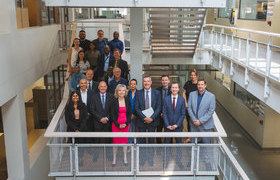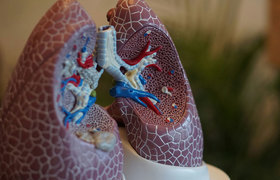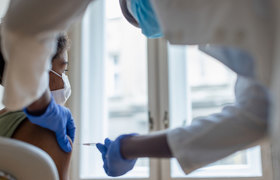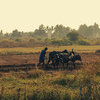Exploring the power of microbes in African populations
17 October 2017 | Story Ambre Nicolson. Photo Lerato Mokhethi.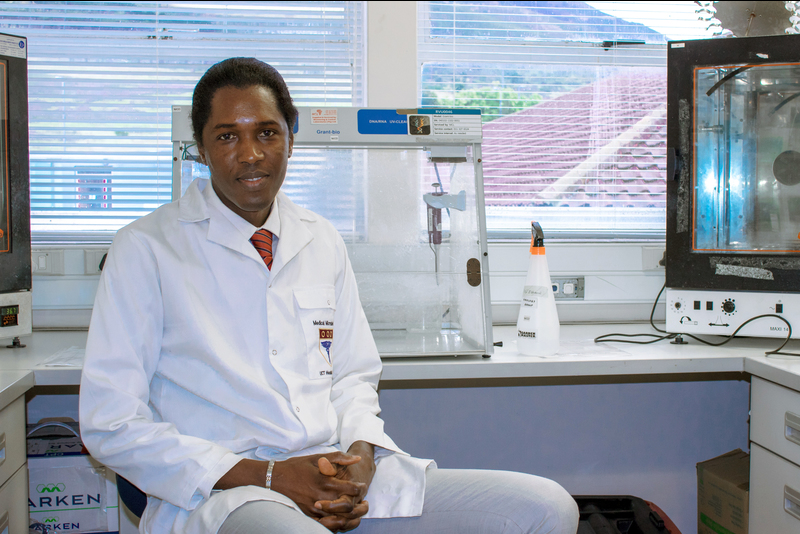
Doctor Mamadou Kaba’s daily work includes studying the role of microbes in the development of childhood asthma, insulin resistance and pain crises in sickle cell disease. These topics are united by his desire to improve the health of Africans by studying the contribution of the microbial populations to disease development and treatment.
"In recent years the role of microbes in human health has enjoyed a huge surge of interest and popularity. Microbes are very small organisms (like bacteria, viruses and fungi) that cannot be seen by the naked eye. The human body is home to many of these microbes. Kaba believes that Africa is lagging behind in this area of research and he would like to see that change. He says African scientists should be more involved in the leadership of studies of microbes that inhabit humans, known as human microbiota studies. Findings from a study conducted under his supervision in 2016 revealed that 87% of these studies in Africa are led by principal investigators from developed countries. He would also like to see more students trained in how to conduct and analyse this kind of research in order to meet the increasing African job market demands of this workforce."
“My field of research requires combined efforts from various scientists to effectively answer research questions about the role of microbes in human health,” Kaba explains.
As an example, he points to the role played by epidemiologists, computational biologists, nutritionists, statisticians, medical doctors, immunologists, biochemists, microbiologists and social scientists in human microbial community studies.
Kaba’s research subjects are equally diverse. As director of the recently established African Microbiome and Epidemiology Research Group (AfriMERG), within the Division of Medical Microbiology, he is now working with two senior scientists, one postdoctoral fellow, and seven postgraduate students on four major research projects.
He explains that all the work that AfriMERG does is with the aim of developing early diagnostic tools for altered human microbial profiles associated with specific diseases, and the development of microbial-based treatments for the prevention or treatment of diseases.
The group is currently conducting a prospective longitudinal study on how the composition of the respiratory tract and gastrointestinal microbial communities (microbiota) influences the development of respiratory diseases in African children, in collaboration with the Drakenstein Child Health Study.
In other words, Kaba said that his group is looking at the relationship between respiratory disease and microbial profiles in young children. He also said that they are now at the stage where they have large microbiota datasets, associated with very detailed clinical data, which they are analysing for association, predictive value and to better understand mechanisms of respiratory disease development.
AfriMERG is also studying the role of the microbes in the repetitive pain crises in sickle cell disease, the faecal bacterial markers for prediction of insulin sensitivity after exercise in a group of obese black South African women and the determination of faecal microbial markers of the maturation of the brain in HIV-exposed uninfected infants.
Kaba’s work has already yielded a number of insights that have led to practical changes in policies. He became interested in fighting infectious diseases because of his medical training in Guinea where he witnessed high mortality rates due to infectious diseases like Malaria, TB, HIV, etc. After completing his undergraduate studies at Gamal Abdel Nasser University of Conakry, he trained as a biomedical researcher and completed his PhD in infectious diseases at Aix-Marseille University in France. While there, one of his works on Hepatitis E infection led to the French public health agency putting new preventive measures in place to avoid pig-to-human transmission of the disease.
Likewise, after Kaba returned to Africa as a Carnegie Postdoctoral Research Fellow in the Division of Medical Microbiology at the University of Cape Town (UCT), one of his works on the role of nasopharyngeal microbial communities in the development of pneumonia in young children led to updated recommendations on sampling methods from the World Health Organization (WHO).
In addition to his role as director of AfriMERG, Kaba also lectures postgraduate students on bacteriology and microbial forensics, teaches the “role of microbes in human health” to learners of the African Genomic Medicine Training (AGMT) Initiative and supervises postgraduate students. Recently, along with his colleagues Doctor Martha Holmes (research officer in the Department of Human Biology at UCT) and Doctor Andre van der Kouwe (radiologist at Harvard), Kaba has been awarded the prestigious American National Institutes of Health Research Project (NIH R01) research grant to study the contribution of microbes in brain development in infants who have been exposed to HIV.
In the future, Kaba hopes that his work will contribute to the better understanding of the role of microbes in human health, especially in populations living in Africa.
 This work is licensed under a Creative Commons Attribution-NoDerivatives 4.0 International License.
This work is licensed under a Creative Commons Attribution-NoDerivatives 4.0 International License.
Please view the republishing articles page for more information.
Research & innovation
